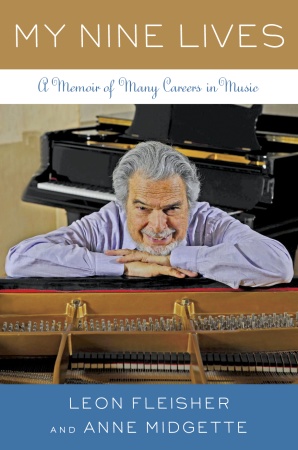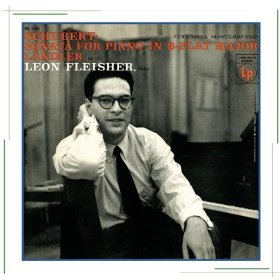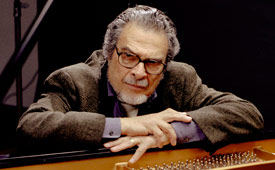Book Review: The Nine Lives of Pianist Leon Fleisher
My Nine Lives reads like a conversation with a man who has worked through more than his share of ups and downs in the world of classical music. The tone is understated and graceful; his narrative could easily have faltered in less skillful hands. Pianist Leon Fleisher aims for a general readership. It’s a very good, classical-lite musical memoir.
My Nine Lives: A Memoir of Many Careers in Music by Leon Fleisher and Anne Midgette. Doubleday, 319 pages with discography, $26.
There are famous people who insist on writing their own memoirs with unreadable results. Then there are the pros, guys like Lee Iaccoca and Andre Agassiz, who have the good sense to tell their story to a working writer. Pianist Leon Fleisher is in the second group, and his memoir My Nine Lives: A Memoir of Many Careers in Music is the happy result. Written in collaboration with accomplished Washington Post classical music critic Anne Midgette, My Nine Lives reads like a conversation with a man who has worked through more than his share of ups and downs in the world of classical music. The tone is understated and graceful; his narrative could easily have faltered in less skillful hands. Fleisher aims for a general readership. It’s a very good, classical-lite musical memoir.
Born in 1928, Fleisher was a child prodigy in the 1930s when classical music was a far bigger deal than it is now. He had toured the world, performed with some of its most eminent conductors, and made extraordinary recordings with conductor George Szell when, at 36, he lost the use of his right hand. He responded by establishing two ancillary careers as conductor and teacher, nurturing many students, and continuing to perform by playing the left-hand piano repertory. He was later appointed Director of the Tanglewood Music Center. He describes this trajectory with candor, offering vignettes about his three marriages, five children, travels around the world, and his many mentors and friends along the way.
Nine Lives begins in San Francisco where Fleisher was the second son of an immigrant Jewish family in the late 1920s. We’re told that his father was a milliner and his mother arrived in the U.S. at 20 from Chelm, Poland. Belying that town’s reputation for dimwits, Bertha Fleisher was pushy, savvy, and efficient, a Jewish mother who gives 21st-century Amy Chua a run for her money. It was his mother who first bought a piano for her elder son, then noticed that Leon was the one with the talent to have a career. It was Bertha who found him his first teachers, a patron (James David Zellerbach “head of Crown Zellerback, which was the largest papermaking corporation in the country”), and a publicist.
Although Bertha was not a regular at synagogue, she knew a cantor well enough to facilitate introductions to local symphony conductors Pierre Monteux and Alfred Hertz. They, in turn, introduced him to the internationally revered pianist Artur Schnabel. Fleisher auditioned for him at age nine, and, breaking his custom of not accepting children (he didn’t like teaching the basics), Schnabel invited the boy to study with him in Italy.
In the summer of 1938, when refugees were streaming out of Europe, the indefatigable Bertha packed up her boy and crossed the United States and then the Atlantic so that he could become the youngest student at Schnabel’s retreat at Lake Como. Artur Schnabel was the descendent of a noble lineage of teachers: Beethoven taught Carl Czerny. Czerny taught Franz Liszt and Theodor Leschetizky. Leschetizky taught Paderewski, and Schnabel was his pupil. “So in the family tree of teacher-student relationships,” Fleisher tells us, “I am in a line going back to Beethoven.”
Fleisher provides interesting glimpses of Schnabel’s bucolic music colony, his gentle teaching style, his family, the piano students to whom he gave group lessons, and his influence on their lives. But, within a year, Schnabel joined the wave of artistic emigres flooding New York. In response, Bertha moved Leon to Manhattan so that the prodigy could continue work with his teacher and (I infer) insisted that the entire family move east.
A year later Leon’s father Isidor closed his two stores in San Francisco, his brother Ray left his high school, and the Fleisher family moved first to the Grand Concourse in the Bronx, then to Washington Heights. In the mornings he practiced; in the afternoons he was tutored. Afterwards he had some free time before dinner, and after that he practiced (or pretended to) again. Schnabel required Fleisher to give up concertizing completely as a condition of studying with him, and I would have liked to read a more detailed account of what motivated the 12- and 13-year-old to stick with it.
Fleisher seems unwilling or perhaps unable to delve deeply into his own psyche or discuss the Fleisher family dynamics. Perhaps Ms. Midgette pushed and was unable to elicit more from him. There’s an occasional toss away line like “I hadn’t really had a childhood and I had been cut off from people,” in the narrative. As a result, we’re left with the impression of an adolescent so monumentally self-centered that he barely noticed the bombing of Pearl Harbor or subsequent war. In fact, throughout the memoir, it’s hard to know what decade we’re in because our only context is Leon.
During the war Leon was, of course, practicing, as well as cultivating his relationship with conductor Pierre Monteux, who finally persuaded Schnabel to let his young pupil perform in public and who facilitated his break-out solo performance with the New York Philharmonic at 16. The New York Times called him “One of the most remarkably gifted of the younger generation of American keyboard artists.”
Fleisher played the Brahms First Piano Concerto in New York with Monteux, and the concerto became his “lifelong companion.” He discusses the piece in one of the “Master Classes,” short chapters about music with which the autobiographical narrative is sprinkled. Here’s a sample that is characteristic of the tone: “Maybe the D Minor is a young man’s concerto. It certainly seized my imagination when I was young with its bigness, its huge ambition, its nobility—and its immediate impact . . . It’s like a symphony, and in fact was originally conceived as a symphony; there’s certainly something symphonic in the way Brahms uses the piano, which makes huge blocks of sound rather than single virtuosic lines. The first movement is somewhat sectionalized, and it can fall into chasms, or pits, so one of the things the soloist has to concentrate on is continuity, keeping it of a piece and understanding that it’s one work.” I would have liked to learn how, exactly, the pianist does that, but instead the pianist says, “it’s a huge role for the pianist: an epic, Shakespearean role, like Hamlet, like Othello.”
To be fair, Fleisher does address items such as Brahms’s early problems with orchestration and how he played the ascending trills in the cadenza of the concerto’s second movement. But chapters like “Master Class” in Fleisher’s hands show how difficult it is to write well about making music. The memoir is far more successful illustrating the role of personal interactions in the course of a twentieth century musical life and career.
Fleisher was one of a generation of OYAPS, Outstanding Young American Pianists of the 1940s including Eugene Istomin, Claude Frank, Jacob Lateiner, Julius Katchen, and Gary Graffman. They provided Fleisher with his first peer group and introduced him to Europe where he and his first wife, Dot, would later live for several years, after he won the prestigious international Queen Elisabeth Competition in Belgium and won in 1952.
That kicked off a busy decade of brilliant performances and recordings, particularly work with the exacting conductor George Szell; their cycle of Beethoven concertos are still considered a landmark. But at the apex of his career, Fleisher’s right hand began to give him trouble. “It began as a sense of laziness in the right index finger, a slight sluggishness in its response when I wanted to play a trill. It continued as a growing sense of clumsiness and a feeling that my fingers weren’t doing what I wanted them to do . . . I had probably been overworking my hand for years, ever since I started stepping up my practicing in the wake of the Queen Elisabeth Competition.”
At 36 Fleisher was forced to re-program and then cancel engagements. He was referred to physical therapists, psychiatrists, and hypnotists as well as all kinds of medical specialists, one of whom tried shock treatment, but none were able to diagnose, let alone fix what was wrong. “Every since I could remember, the most important thing in my life had been playing the piano,” he writes in one of the most candid and moving passages of his memoir. “It was more important than anything in my family when I was growing up . . . No relationship, no activity—not even my wives or my children—held the same central focus in my life, the same hold on my waking hours. At thirty-six years old, I was coming into my own . . . And now because of two stubborn fingers, it was all being torn away from me . . . I couldn’t talk about it . . . Putting words around what happened only intensified the pain . . .”
Fleisher notes that he thought seriously about suicide, but married, with four children, an ex-wife, and a baby on the way, he threw himself into his teaching job at the Peabody Conservatory in Baltimore instead. At home he kept playing the piano every day. “Even without the use of two fingers, I didn’t know how to stop. Music had always been the thing I used to make sense of my life. My fingers might be lamed, but the music didn’t live in my fingers. It was in my mind, and my heart. It was still there.”
After about a year of mourning what he thought was the end of his career as a concert artist, Fleisher began to explore the piano repertory for the left hand. It was larger than he thought: there were pieces written as stunts, exercises, or experiments. There was a series of concertos commissioned by Paul Wittgenstein, brother of the philosopher, and a composer-pianist who had lost his right arm in the First World War. The most famous was the Ravel Concerto for the Left Hand. Fleisher learned it and another piece Wittgenstein had commissioned: Benjamin Britten’s Diversions for Left Hand and Orchestra.
After two years, a bearded, pony-tailed Fleisher returned to the concert stage as a “left-handed pianist” but immediately felt the limitations of that role. Friends suggested that he turn to conducting, and one of them suggested he lead a small chamber ensemble in Washington, D.C. Conducting promised another kind of life in music, and Fleisher tried it. One thing led to another, and pretty soon he was conducting all over the country as well as continuing to teach at Peabody. But his marriage buckled under the strain, and, as he puts it succinctly, his second wife threw him out. At 43 Fleisher “moved into an SRO kind of place a block away from Peabody . . . then rented a place in a big red-brick building of soulless little apartments . . .My children came to stay with me on weekends. I loved them, but had no idea what to do with them . . . I could think great thoughts about Beethoven, but when it came to family life, I was as helpless as many other divorced dads of my generation.”
That, readers, is probably the low point of the memoir, which then rebounds and has a happy ending. The pianist is hired and then fired as director of the Tanglewood Music Center by an, in Fleisher’s view, inscrutable Seiji Ozawa. After nearly 30 years of looking for a way to play with two hands again, Fleisher finds that Botox and therapy make it possible. He marries for a third and, he implies, final time. He reconciles as best he can with his two ex-wives and five children. He is awarded the Kennedy Center Honors, along with Diana Ross, Steve Martin, and Martin Scorcese and gets to watch a movie of his life introduced by Yo Yo Ma.
The book ends with a burst of applause. Fleisher gets mine as well. Although I would have preferred more depth throughout, it’s a very good guy account of a musical life in the twentieth century, well-told. Bravo!
=====================================================
Helen Epstein is the author of several books about performers and cultural life.
Tagged: Classical Music, Culture Vulture, Jewish mother, Leon-Fleisher, My Nine Lives, Pianist, child prodigies, left-hand, musical memoir



